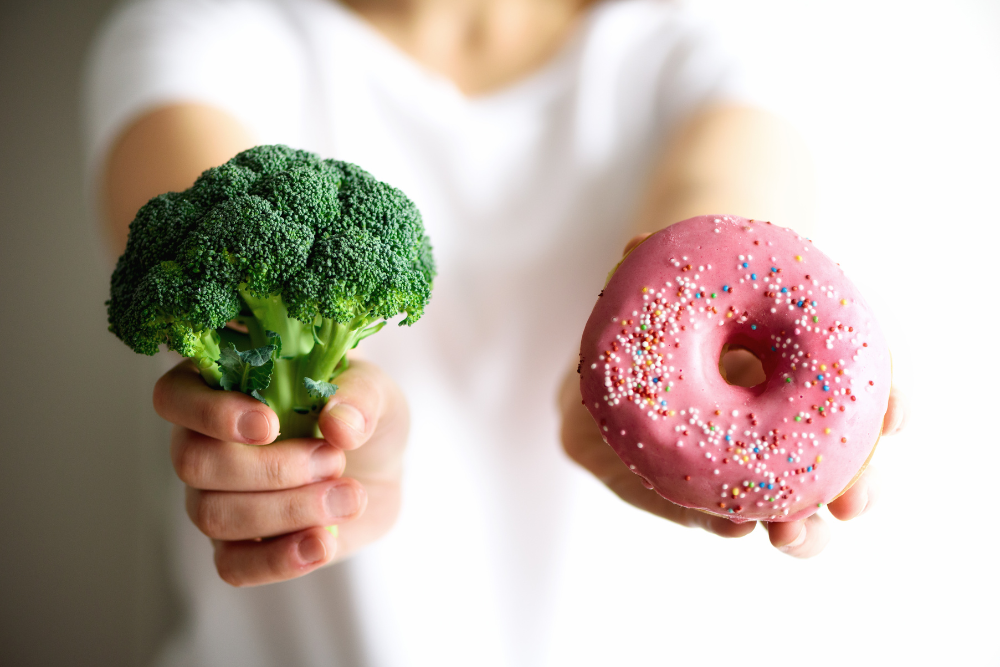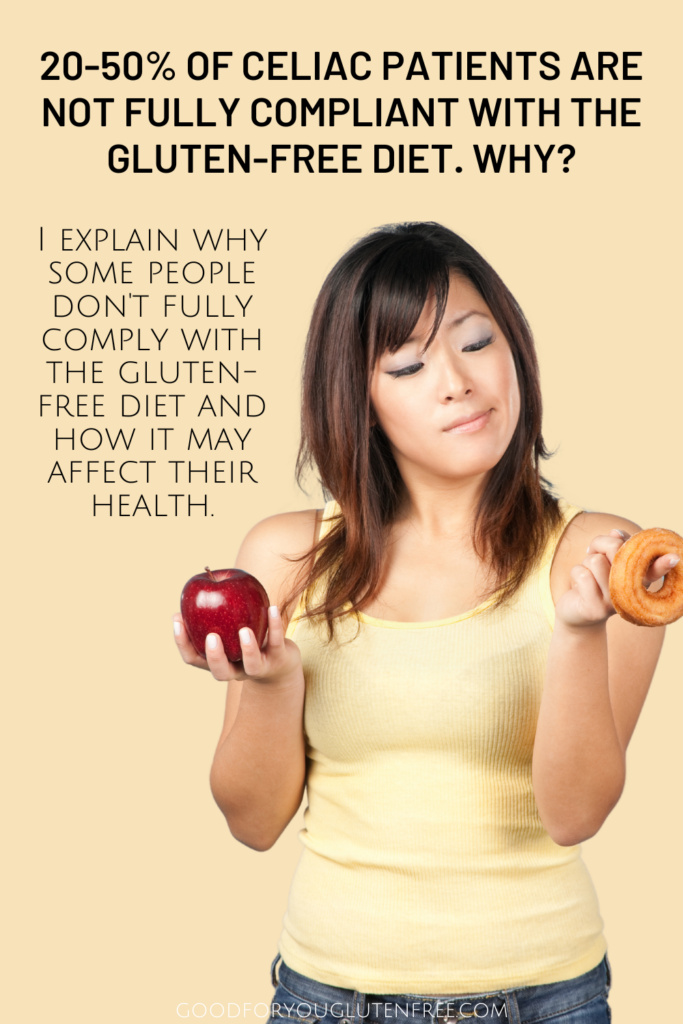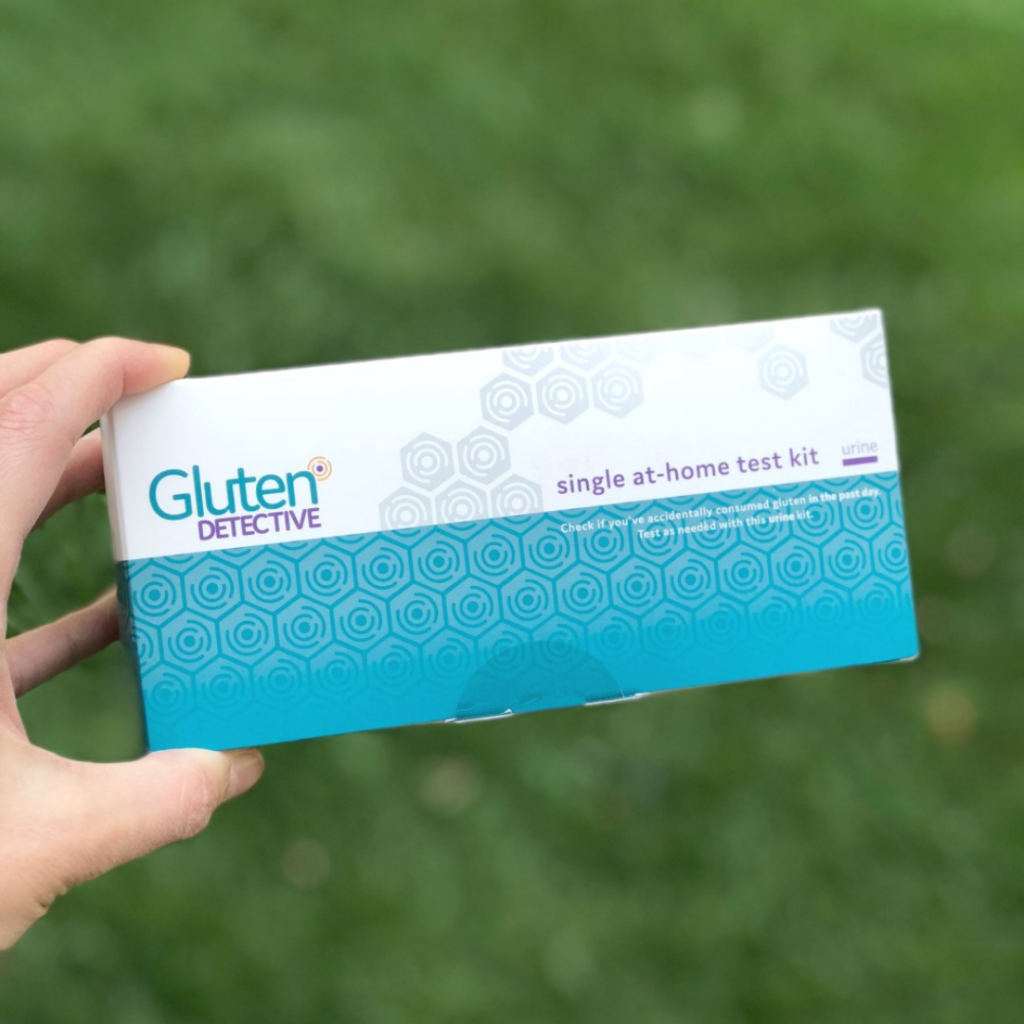
Research suggests that not all people with celiac disease strictly follow a gluten-free diet, and many factors can influence a person’s adherence level. In this post, I explain why some people don’t fully comply with the gluten-free lifestyle and how it may affect their health. This post contains affiliate links. Please see my disclosures.
Getting diagnosed with celiac disease is life-changing and can turn a person’s world upside-down. No magic pill or procedure will make celiac disease go away, and the only treatment for the autoimmune disorder is a strict, lifelong gluten-free diet.
Every time a person with celiac disease eats gluten, a protein found in wheat, rye, and barley, their immune system becomes confused and attacks the healthy tissue surrounding the small intestine.
For some people, this leads to a slew of painful and annoying symptoms, including gastrointestinal disorders, serious skin disorders, growth issues in children, chronic fatigue, low bone density, various brain disorders, and more.
One expert suggests the rates of non-compliance with the gluten-free diet might be as high as 20 to 50 percent. This number sounded high to me, so I did a little digging and found a few other data points that suggest the rate of non-compliance is just as high or higher.
- Researchers analyzed six studies about gluten-free dietary compliance; they found that adherence rates ranged from 45 to 90 percent. In other words, 10 to 55 percent were non-compliant!
- A survey of adults with celiac disease found that only 65 percent admit to “fully” adhering to the gluten-free diet, 31 percent say they are “partially” adhering, and four percent admit they don’t adhere to the gluten-free diet at all.
I recently learned of one high-profile celebrity with celiac disease who doesn’t follow a strict gluten-free diet. Cameron Mathison, who has celiac disease, says he doesn’t follow a strict gluten-free diet.
Subsequently, Mathison was diagnosed with kidney cancer in 2019 and says he continues to struggle with his health.
TikToker and wannabe model Kayley Ireland, who has celiac disease, shared a video of herself purposely eating a gluten-y chicken biscuit sandwich.
The gluten-free community was up in arms, telling her to stop trivializing a serious disorder.
However, in a second TikTok, Kayley laughed off her critics: “All I did was eat a chicken biscuit because I can’t stay away from gluten. Now everybody’s angry. I guess we’re about to get angrier because I ate another one.”
While many people with celiac disease can’t imagine eating gluten ever again, for others, compliance is not an easy feat and one influenced by a number of environmental and socioeconomic factors.

Why Low GFD Adherence Rates?
Dietary adherence among celiac patients can be influenced by several factors, including:
- The high burden of strict compliance.
- The complexities of label reading and keeping up with sometimes contradictory dietary guidelines.
- The high cost of gluten-free food.
- Lack of availability of gluten-free food.
- The low perceived benefits, especially for those with asymptomatic celiac or less impactful symptoms when they eat gluten.
- Age at diagnosis.
- Lack of support from family, friends, or even a local celiac group.
Below, I discuss what I see as the three main reasons why some celiac patients choose not to follow a gluten-free diet, of course, at the risk of their health outcomes.
Reason #1: High Burden Associated with a Gluten-Free Lifestyle
One reason people with celiac disease are not fully compliant is likely due to the high burden associated with following a strict gluten-free diet.
Full compliance requires individuals to turn their lives upside-down, and several studies conclude that a gluten-free diet may lower one’s quality of life despite helping to improve their health outcomes.
This is why a gluten-free diet is a Catch-22 for celiac patients.
On the one hand, if they want to feel physically better and put their symptoms into remission, they must follow a strict gluten-free diet.
On the other hand, strict adherence can significantly reduce their quality of life. For example, people with celiac disease must plan their meals ahead of time, learn how to cook, and significantly reduce their reliance on eating out.
They are also forced to discuss their disorder repeatedly when they eat at restaurants, attend professional and social events, and travel – no more spontaneous weekend getaways or planning a dinner on a whim at a friend’s house.
Such experiences can feel humbling, isolating, embarrassing, and even attention-seeking, even though people with celiac disease don’t want to bring attention to their disease time and time again. Who wants to discuss their “disease” with every waiter they meet?!?
Furthermore, people with celiac disease fear being put in situations where they have little control over the preparation of their food, making the burden too heavy for some.
It’s in these moments when they need to decide if they want to advocate for what they need, not eat at all, or take a risk by eating what’s provided and hoping for the best. Some will even willingly cheat on their “diet” to fit in and not make a fuss.
In a survey of single British people, 44 percent said they perceive those on a gluten-free diet as “high-maintenance,” which might as well be a code word for “undateable.” Understandably, some people sensitive to what others might think of their dietary restrictions wouldn’t want to bring attention to it on a first date.
Plus, it can still go wrong even when someone advocates for what they need. An inmate with celiac disease died because prison officials didn’t take her diet seriously despite her pleas for a safe meal.
Many people eat out and still get accidentally glutened. One study found that approximately 18 percent of celiac disease patients were found to have gluten traces in their stool. (Editor’s Note: You can use this at-home test to check for gluten via urine or stool.)

Reason #2: High Cost of Gluten-Free Food
The high cost of gluten-free food may also affect a person’s ability to fully comply with the gluten-free lifestyle. Most gluten-free products cost 2-3 times more than their non-GF counterparts, which can be a deterrent for those struggling to make ends meet.
One study found that people with celiac disease that come from “an affluent background” and have a “university education” are more likely to adhere to a gluten-free diet, likely because of their ability to seek nutrition help and pay for gluten-free food.
Another study found that people from high-income backgrounds also experienced better overall health outcomes and fewer symptoms.
Reason #3: Low Perceived Benefits
Another reason some celiac patients don’t fully adhere to the gluten-free diet is they don’t have symptoms bothersome enough to incentivize them to do so, or they may not have any symptoms in the first place (asymptomatic or silent celiac).
Sixty percent of children and 41 percent of adults diagnosed with celiac disease are asymptomatic (without any symptoms) even though they experience the same intestinal damage (villous atrophy) as symptomatic celiacs.
Without symptoms, it’s understandable why this segment of the celiac population may not feel they need to tackle a burdensome gluten-free diet, given they don’t feel there are any symptoms to alleviate.
Celiacs Should Follow a Strict GFD
This article offers insights into why some people find a gluten-free diet too difficult to follow in the way it needs to be followed.
However, it’s not an article giving people with celiac disease permission or justification for eating gluten.
In fact, a gluten-free diet is absolutely necessary for people with celiac disease and should not be ignored.
Doctors and nutrition professionals should strongly encourage people with celiac disease to fully comply with a gluten-free diet despite the high burden and high costs associated with the lifestyle.
Even people with asymptomatic celiac put their lives at risk every time they eat gluten because regardless of symptoms, gluten damages their body, impairs nutrient absorption, creates persistent inflammation, and eventually, like a leaky faucet, leads to irreparable damage, health complications, and early death.
Of course, celiac patients must carefully balance dietary vigilance with quality of life. They must not restrict themselves beyond what is necessary.
For example, there’s no need for someone with celiac disease to go on endless elimination diets, which are meant to be temporary. They must avoid diet culture fads like keto, paleo, and no-carb diets that restrict their diet beyond what’s necessary.
To encourage dietary vigilance, gluten-free dieticians and nutritionists should be careful not to push or promote the elimination of all grains, dairy, sugar, and other foods. They also should be mindful of their stance on oats, as there are many alarmist calls for celiac patients to steer clear of oats, even if they’re labeled “gluten-free.”
Eliminating gluten is one thing, but adding another food group to avoid the mix is an unnecessary restriction that should only be encouraged when other interventions fail or when the patient has a proven allergy or intolerance to that food.
Finally, eating gluten despite having celiac disease is someone choosing to harm their body deliberately, and that’s not okay.
While these people should not be judged or admonished, interventions should be considered to help them correct their ways.
Understandably, they may need to seek nutrition coaching or mental health counseling to help them “do” gluten-free in a way that works for their lifestyle. This is a treatable disorder that requires ongoing nutritional and mental health support.
The bottom line is that it’s important that people with celiac disease are mindful of what’s at the end of their fork.
The food they eat (and don’t eat) can help them live a long, healthy life free from disease, or it can slowly chip away at their health, force them to live in a prolonged state of mortality, and even lead to an untimely death.
The choice is personal, but the truth is most people need to consider if they’re willing to pay now or pay later.
Additional Reading
- What Happens If You Eat Gluten When You Have Celiac Disease?
- Can You Be Too Gluten-Free? How to Balance Dietary Vigilance Without Losing Your Mind
- Gluten Detect (formerly known as Gluten Detective) Test Review
- Survey Reveals ‘Eating Out Safely’ as the Top Challenge Facing the Gluten-Free Community
- The Ultimate Guide to Eating Out Gluten-Free (ebook)
- Are Oats Gluten Free? Unpacking Confusing and Contradictory Information
- Why Does Celiac Disease Affect More Women Than Men?
Definitely work with a nutritionist to do an elimination diet. Then you’ll know for sure if the food bothers you. Also heal your gut then see if you still have an intolerance to dairy. Hope this helps.
I found the point about not necessarily going on other diets with other limitations very interesting. I’ve been reading articles and seeing videos that suggest dairy may cause as much damage as gluten. I’m asymptomatic to gluten. How can I tell if dairy or other foods are causing damage the way gluten is? I tend to get a lot of allergic reactions. How can you figure out which foods are causing unwanted antibodies and autoimmune responses and which foods are helping if you can’t tell by the symptoms? How does one tell what’s safe? Thanks.
Many people who have a diet of a lot of fast food probably find it more difficult. We have so many choices today compared to many years ago when there was nothing and not even acknowledged by medical profession. I am gluten intolerant also diabetic I choose to eat to live not to live to eat it is what you are willing to do and change. I now have a very healthy diet and I don’t miss heavy gluten meals at all. Walking past a bakery is hard but I remind myself of consequences. Diane
In reference to:
“One study found that people with celiac disease that come from “an affluent background” and have a “university education” are more likely to adhere to a gluten-free diet, likely because of their ability to seek nutrition help and pay for gluten-free food.”
If you buy meat, potatoes, veggies, fruit, salad, etc., it’s not cheap, but it’s not more expensive than the outrageous prices on processed gluten free junk. I wouldn’t necessarily say that just because the affluent can afford it, they are more likely to adhere. In general, unfortunately, it would seem that a huge number of people just prefer to eat processed garbage.
Such a supportive and great article. Thank you! I shared it with my spouse because occasionally he forgets how stressful the g-free diet is on me and complains I’m being anti-social when acquaintances invite us over for dinner. Its humiliating and exhausting having to explain it to people. I’ve gotten very sick eating at the home of some who were well-intentioned but really were clueless to the pervasiveness of gluten everywhere! It’s just not worth it for me.
It’s very hard to say anything without sounding judgmental. You can only model behavior. If your friends get sick and seek medical attention, it’s likely their dr will give them the stern advice they need.
As always, great content. For symptomatic Celiac’s, there needs to be a period of healing in the gut. My Dr said it could take up to 2 yrs before I could eat a vegetable and NOT feel symptoms. She was right. Removing dairy too, helped with the healing. After 7 years post diagnosis, I cannot eat gluten, dairy, corn, russet potatoes, oats or soy. Partner has peanut allergy so we are quite the pair! LOL Sadly, there’s a lot of hit/miss with developing proper compliance, too.
I’ve encountered a couple of people recently who admitted they have celiac and don’t fully adhere to a gluten-free diet. One said she “cheats” fairly often and the other doesn’t follow it at all. I didn’t know what to say that would express my concern for their health without sounding judgmental so I just kept quiet. What would you say?